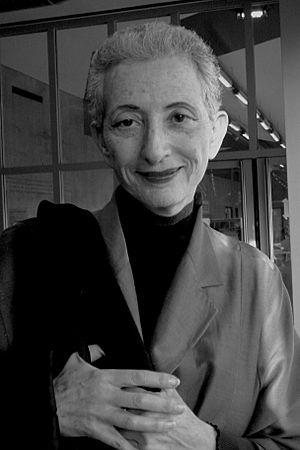Hélène Cixous facts for kids
Quick facts for kids
Hélène Cixous
|
|
|---|---|

Hélène Cixous, in September 2011.
|
|
| Born | 5 June 1937 |
| Era | Contemporary philosophy |
| Region | Western philosophy |
| School | Continental philosophy Post-structural feminism French feminism |
| Institutions | University of Paris VIII European Graduate School Cornell University |
| Doctoral students | Frédéric Regard |
|
Main interests
|
Literary criticism |
Hélène Cixous (born June 5, 1937) is a famous French writer, playwright, and literary critic. She is known for her creative and experimental writing style. Over her long career, she has written more than 70 books, including plays, novels, and essays.
Cixous helped start a new university in France called the University of Paris VIII in 1969. There, she created the first center for women's studies in Europe. This was a place where students could learn about history and society from a woman's point of view.
She became well-known in 1969 for her novel Dedans (which means Inside). The book, which was partly based on her own life, won a major French literary award called the Prix Médicis. She is also famous for her 1975 essay, "The Laugh of the Medusa". This essay shared important new ideas about feminism. Many people believe she is a strong candidate for the Nobel Prize in Literature.
Contents
Life and Career
Early Life and Education
Hélène Cixous was born in Oran, a city in French Algeria, to Jewish parents. Her father, Georges, was a doctor who sadly died of tuberculosis when Hélène was young. After his death, her mother, Eve, worked as a midwife in Algiers.
In 1955, Cixous married Guy Berger, and they had three children. They later divorced in 1964.
Cixous was an excellent student. She earned a high-level teaching degree in English in 1959. In 1968, she completed her doctorate, with her main focus being on the famous Irish writer James Joyce.
A New Kind of University
After student protests in France in 1968, Cixous was asked to help create the University of Paris VIII. This new university was meant to be an alternative to the traditional French universities. It was here, in 1974, that she founded the university's center for women's studies, the first of its kind in Europe.
Cixous has taught at the University of Paris VIII for many years. She also teaches at the European Graduate School in Switzerland and has been a visiting professor at Cornell University in the United States.
Famous Writings
In 1968, Cixous published her first major academic book, which was about James Joyce. The next year, her first novel, Dedans, was published and won the Prix Médicis award.
She has written many books, poems, and plays. Her work is often described as deconstructive, which means it takes apart old ideas to find new meanings. She has written about many famous writers and thinkers, including Franz Kafka, Michel de Montaigne, and her friend Jacques Derrida.
Cixous is considered one of the most important thinkers in post-structuralist feminist theory, along with Luce Irigaray and Julia Kristeva. In the 1970s, she began writing about the connection between language and a person's identity.
Key Ideas and Influences
Jacques Derrida
Cixous and the philosopher Jacques Derrida were lifelong friends. Both grew up as French Jews in Algeria, which gave them a unique perspective on identity and belonging. Derrida's ideas about language and meaning greatly influenced Cixous's work.
Derrida developed a concept called logocentrism. This is the idea that Western culture has historically valued spoken language more than written language. It also points out that our language is often built on pairs of opposites, like good/bad or man/woman, where one is seen as better or more important than the other.
Cixous used this idea to explore how language has often been centered on male perspectives. She argued that this way of thinking defines women by what they are not, rather than by what they are. She encouraged women to find a new way of writing to express their own experiences.
Major Work: "The Laugh of the Medusa"
Cixous's most famous essay is "The Laugh of the Medusa", written in 1975. In this work, she challenges old stories and myths that show powerful women as monsters. The Medusa, a figure from Greek mythology who could turn men to stone with her gaze, is re-imagined by Cixous. Instead of being a monster, her "laugh" represents women finding their own voice and power.
The essay encourages women to write from their own unique perspectives. Cixous called this new style of writing écriture féminine, which is French for "feminine writing." She believed this would help women break free from traditional ways of thinking and express themselves more fully.
Awards and Recognition
Cixous has received many honors for her work. She has been awarded honorary degrees from universities all over the world, including:
- Queen's University and the University of Alberta in Canada
- University College Dublin in Ireland
- The University of York and University College London in the UK
- Georgetown University, Northwestern University, and the University of Wisconsin–Madison in the USA
See also
 In Spanish: Hélène Cixous para niños
In Spanish: Hélène Cixous para niños
- List of deconstructionists
- Jean-Louis de Rambures, "Comment travaillent les écrivains", Paris 1978 (interview with H. Cixous)
 | Laphonza Butler |
 | Daisy Bates |
 | Elizabeth Piper Ensley |

